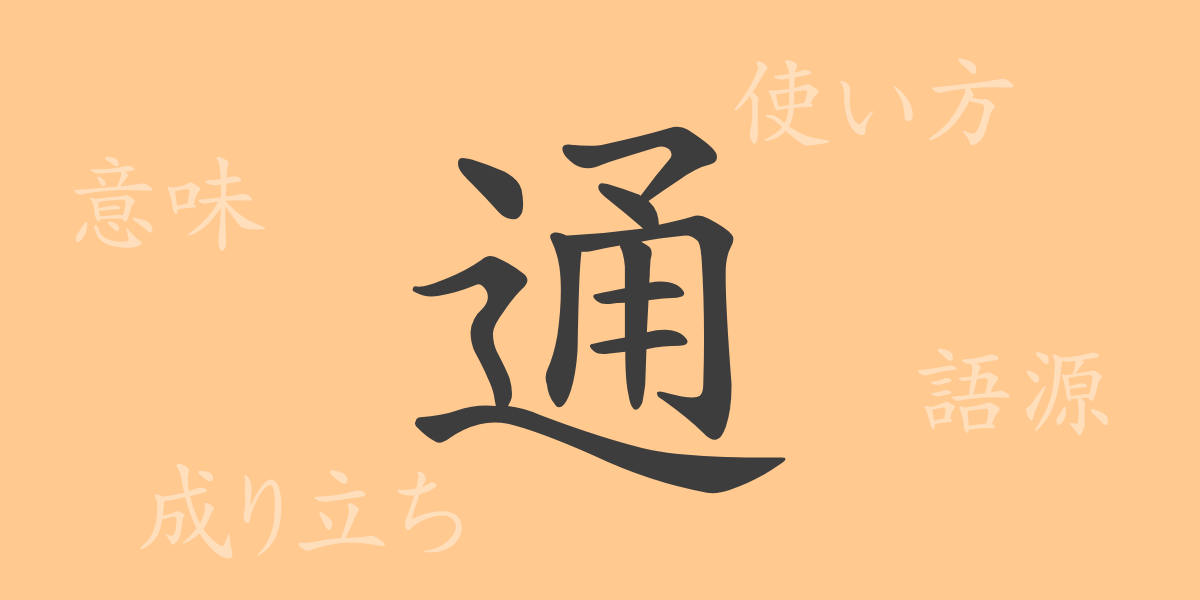The complexity of the Japanese language is illustrated through its kanji, each possessing unique meanings and historical significance that deeply influence Japan’s culture and language. Today, we focus on the common kanji ‘通(ツウ)’, exploring its origins, contemporary usage, and its related phrases and idioms to deepen our understanding of Japanese.
Origins of ‘通(ツウ)’
The kanji ‘通’ originated from ancient China, initially represented in oracle bone script. It was originally a pictograph representing people and vehicles traveling along a path. Over time, its form evolved to the current ‘通’, symbolizing not just the physical act of passage but also the smooth progression of matters and the spread of information.
Meaning and Usage of ‘通(ツウ)’
‘通’ carries meanings like ‘to pass’, ‘to continue’, and ‘to carry through’. Commonly used verbs include ‘通る(とおる)’ for something that is connected or passable, and ‘通す(とおす)’, indicating making something pass through. ‘通じる(つうじる)’ expresses deepening mutual understanding, and terms like ‘通知(つうち)’ and ‘通信(つうしん)’ refer to the transmission of information, reflecting the versatility and breadth of ‘通’ in Japanese.
Pronunciation, Stroke Count, and Radical of ‘通(ツウ)’
Understanding the kanji ‘通’ includes its pronunciation, structure, and more:
- Pronunciation: The On’yomi reading is ‘ツウ’, while Kun’yomi includes ‘とおる’, ‘とおり’, ‘とおす’, ‘とおし’, ‘-どおし’, ‘かよう’.
- Stroke Count: ‘通’ consists of 10 strokes.
- Radical: Its radical is ‘辶’ (しんにょう), suggesting movement or progression.
Phrases, Idioms, and Proverbs Using ‘通(ツウ)’ and Their Meanings
‘通’ appears in numerous idioms and phrases that showcase the richness of expression in Japanese:
- 通学(つうがく) – Going to school.
- 通勤(つうきん) – Commuting to work.
- 一通り(ひととおり) – Roughly one method or kind.
- 通夜(つうや) – A Buddhist wake ceremony held the night before a funeral.
- 通じる(つうじる) – To be understood by someone.
- 道理に通じる(どうりにつうじる) – To be logical or reasonable.
- 人通り(ひとどおり) – A street through which people pass; also refers to pedestrian traffic.
- 天下りを通す(あまくだりをとおす) – Facilitating employment from public to private sector.
- 通りがかり(とおりがかり) – Passing by coincidentally.
These expressions embody ‘通’s meanings of ‘transmission’, ‘movement’, and ‘universality’.
Conclusion on ‘通(ツウ)’
As explored, the kanji ‘通’ enriches Japanese communication and mobility concepts through its evolution in form and meaning. It is essential in various aspects of life, reflecting the intricacies and beauty of the Japanese language. Understanding its diverse uses and meanings helps us appreciate the depth of the Japanese language even more.

























